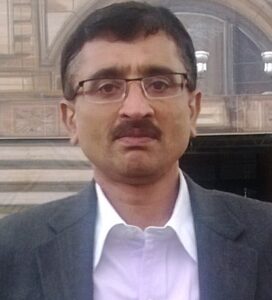A professor’s passion for Bhutan
Thimphu-based Sanjeev Mehta, professor of Economics at Royal Thimphu College, has been living in Bhutan for over two decades. He has developed the curriculum for BA (Hons) course in Economics and has been a member of the academic board. Prof Mehta has also worked as a UNDP International Consultant for developing the Industrial Policy of Bhutan. He has been a guest faculty at the College for Science and Technology, Kharbandi, and the Royal Institute of Management, Thimphu.
His research areas cover poverty, inequality, local government and FDI and his areas of interest include development economics, macroeconomics, globalization and research. His recent book, Nature and Structure of Bhutanese Economy has received critical acclaim.
In a freewheeling interview, Prof Mehta talks about his unique experience of living in the Himalayan Kingdom, his consultancy on issues related to poverty, inequality, public policy, education and financial analysis, and about Bhutan’s strategic importance as India’s neighbour.
Q: Sir, you have been living in Bhutan for more than two decades. Kindly tell us about your journey to this Himalyan Kingdom…
Overall, it has been a great and satisfying experience. I came to Bhutan on 24 September 1993 to join Sherubtse College, Kanglung. Working in a truly multicultural environment with diverse set of faculty helped me immensely to gain wider experience in a relatively short period.
In 2008, I got an opportunity to work as a lead consultant to develop Economic Development Policy of Bhutan. Later, in 2009 I joined Royal Thimphu College at the stage of its institutional and academic planning. This was a unique and highly satisfying experience to get actively involved in the making of an institution.
Despite being an outsider, I have always been treated by Bhutanese people as one of them. Bhutanese people from all walks of life have given me so much of love and respect. I feel truly indebted to them. This is due to this love and respect I have stayed in Bhutan for more than two decades. Now it’s difficult for me to decide whether I am more an Indian or a Bhutanese.

Q: What’s so striking about an Indian living there for so many years?
Bhutan and India have very close relationship both at the level of government and people. In fact, there are many Indians from various walks of life, who are living in Bhutan for a longer period of time. They have few common traits- search for stress-free life, hard work, greater adaptive capacity, honesty of purpose and humility. It is not due to lack of ambitions but due to greater satisfaction that makes outsiders stay for long duration in a country called Bhutan. Indians are ‘Jugadu’ by nature and they manage to work and stay despite some odds.
Q: You’re exposed to different cultures in such a small place. Tell us about your positive and negative experiences in Bhutan.
There are striking similarities as well as equally conspicuous dissimilarity in our culture. Bhutanese people, in general, are very simple and straightforward. The love and respect that I have received is simply the most exhilarating experience in Bhutan. In times of my personal crisis, I found them standing firmly behind me; it is something highly unlikely elsewhere.
Q: How big is the Indian community there?
Indian community is ubiquitous and makes largest expatriate group in Bhutan, comprising construction labourers, businessmen, teachers, Indian armed forces and other professionals. They constitute an important element of Bhutanese life and economy. Earlier, at Sherubtse College almost 60% faculty was Indian and it used to look like a small Indian cosmopolitan town but now fewer Indians can be seen due to obvious increase in the share of Bhutanese people. Unfortunately, there is no formal platform to bring together this diverse pool of Indians.
Q: Traditionally, Bhutan is India’s close ally. Yet, the ties have seen its peaks and troughs…Do you think India’s current dispensation will bolster ties with Bhutan? How do the locals see Narendra Modi’s landslide victory in the May, 2014 elections?
Indo-Bhutan ties are much deep-rooted due to historical, strategic and economic factors. Continuity in the foreign policy irrespective of the political party in power, makes Indo-Bhutan relations very stable. Indo-Bhutan relationship is an illustrative example of regional cooperation in South Asia where regional cooperation exists only on paper. There was a minor trust deficit problem between the two countries in 2012 but fortunately it was sorted out well before it could take ugly turn. Narendra Modi’s visit to Bhutan soon after he took over as PM was seen as a major confidence-building measure.
During election time also many Bhutanese were highly appreciative of Mr Modi and were confident that the change in the government in India would only cement the ties. Generally speaking, Bhutan was also engulfed by the ‘Modi wave’. The current Indian budget has provided an increase in the development assistance to Bhutan, which has gone very well with media and public.
Q: You worked as UNDP international consultant to the Ministry of Economic Affairs, Royal Government of Bhutan to design economic policy. Kindly share your experience…
Involvement at policy-making level has always been enriching. It helped me to understand the mindset of policy-makers and bureaucrats who at heart want to maintain status quo but due to growing demand for reforms are pulled in the opposite direction. I could see the wide gap between aspiration for reforms in the business community and preparedness on the part of decision-makers to carry out reforms both in terms of its magnitude and pace.
I also noticed that various ministries and other important autonomous agencies operate in silos and lack a common approach. As a consultant, it was challenging to keep both the parties happy. I was also appreciative of some individuals in the government who thought differently and provided a fresh approach to the problems.
Q: In 1972, Bhutan adopted the philosophy of Gross National Happiness (GNH), a holistic approach to development that moves beyond GDP and takes into account shared prosperity, environmental sustainability, cultural preservation and other factors essential for human well-being. Your comments…
GNH represents a new thinking in development economics which aims to measure human welfare on a broader basis. Bhutan being a Buddhist country places spiritual progress as an important element of development philosophy. I think it represents an approach to immunize Bhutan from the huge wave of globalization which tends to widen inequalities and also imposes a threat to culture and environment.
One of the pillars of GNH is good governance and this is significant for making government people-and development-friendly. Only problem is its measurement, and without which GNH cannot replace GDP. Many also see it as a limiting force which tends to slow down the pace of growth due to constraints imposed by this philosophy.
Q: Recently there was a Camp Rural-Urban Friendship (RUF), a 10-day camp that brought together over 100 youth from rural Dagana in southern Bhutan and Thimphu, all aligned with the motto “where we educate our hearts.” How do you view this concept of ‘learning to nurture our hearts’?
It is a wonderful idea to develop social capital through such an exercise. Rising inequalities and competition tend to create hatred, distrust and ill-will against each other and societies get fragmented. Often such behavior translates into violence and terror. Bringing such people together and interact and connect to each other tend to strengthen the positive energy. It is the need of time.
Q: You have written a book Nature and Structure of Bhutanese Economy. What’s your take on removing poverty and ensuring education for all and proving affordable healthcare?
I don’t think such a question can be easily answered within the framework of this exercise. I believe growth is led by poverty alleviation through so-called inclusive growth. For growth to translate into poverty alleviation and greater social justice, the processes of trickle down need to be strengthened. Prof Amartya Sen’s capability approach provides guidelines for it. To tackle issues related to poverty and deprivation, we need to understand the way these people and planners make decisions. With this understanding, the poverty alleviation and empowerment would become much more rapid.
Ensuring education and health care to all would require greater targeted spending by the government along with attempts to know behaviour patterns. Greater public-private partnership, corporate social responsibility, expanded network of social security, use of appropriate technology (like promoting preventive health care) and international cooperation are significant inputs to this goal.
